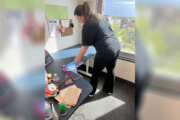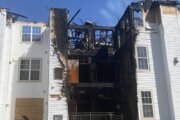WASHINGTON – Harsh penalties can befall ticket scalpers, including those selling at face value, the D.C. chief of police said Thursday as officers prepare to step up enforcement for the Nationals’ postseason.
No one can walk toward a sporting event without being offered tickets for sale on the street. Chief Cathy Lanier says this is illegal, even if the hawker doesn’t increase the price.
Those who break this law are subject to fines, or even harsher penalties, she says.
“It’s an arrestable offense,” Lanier said while speaking on WTOP’s “Ask the Chief.”
Police usually step up patrols around the Verizon Center during large events and enforce this law, she says. The department is already planning to bolster the police presence around Nationals Park by at least 40 officers to add to the existing 18 to 20 who monitor the park and immediate neighborhoods.
Celebrations will extend far beyond the park, Lanier says, as more people who can’t get to the stadium will watch the games at parties or sports bars.
The D.C. scalper law says, “No person shall sell or offer to sell tickets from the sidewalks, streets, or public spaces anywhere in the District of Columbia for any excursion, theatrical performance, opera, ball game, or any entertainment of any kind.”
The penalty is a fine up to $300 or up to 90 days in prison.
Learn more in our live blog about when block-the-box cameras will be coming to D.C., the future of speed camera ticket fines and the bizarre history of the District’s police force:
10:54 a.m., speaking about MPD history:
In 1805, there were four constables on patrol (which is where “cop” comes from).
The officer who was supposed to be guarding President Lincoln the night of his assassination was either out drinking or with a prostitute. “It’s not one of our prouder moments.”
MPD stopped President Ulysses S. Grant for speeding in his horse and buggy. They gave him a fine and let him walk back to the White House.
10:51 a.m., speaking about D.C. Council consideration of lowering speed camera fines:
Traffic fatalities have come down almost 80 percent.
It makes you slow down when you cross into the District.
Whatever laws the council puts on the books, we’ll support them.
10:46 a.m., speaking about D.C. Councilmember Michael Brown’s allegations that missing campaign money was stolen:
There is an ongoing investigation. We are still looking for concrete evidence.
It is not our job to rush or drag our feet for anyone else’s purposes.
10:41 a.m., speaking about a rise in violent crime:
Robberies this year are down from a 9 percent increase, and down another 2 percent in the last two weeks. I hope that will be a negative number by the end of the year.
10:36 a.m., speaking about purchasing pepper spray, which D.C. law requires to be registered:
The person who sells it to you is required to register it. There is no penalty for purchasing. You can carry it in public.
Anything above pepper spray, such as Mace or OC Spray is an entirely different chemical.
10:34 a.m., speaking about current numbers of police:
There are roughly 3,900 officers.
Roughly 40 of them are “senior police officers,” part of a program used to retain retired, more experienced officers. They’re like contract employees.
Most of our senior officers stay for “several, several years.”
We have roughly 30 officers who will retire by the end of the year.
We’re fine maintaining current levels now, but we’ll be hitting the “retirement bubble” in a few years when we may have to hire more officers.
10:32 a.m., speaking about her message to new officers:
The five or six most important things about being a police officer: The way you interact with people determines how people respond to you and how they view the police department as a whole.
Establish relationships so people feel comfortable coming to you and giving you information. And, it’s OK to show a little compassion. We aren’t robots.
10:27 a.m., speaking about blocking the box:
We’ll have photo enforcement for that soon. The problem with enforcing it with police officers is that a manual traffic stop triples the traffic backup that already exists.
That should be coming by the beginning of the year.
10:26 a.m., speaking about Occupy DC:
They’re still around. We didn’t have any arrests. They were pretty cooperative with police.
“For the past year, it’s been pretty quiet here.”
10:25 a.m., speaking about the arrests in the beating of a man on Capitol Hill :
The three men were arrested for a separate robbery that same night. We know they have been involved in at least two, and we are looking at their connection with other robberies, such as the other beating.
10:24 a.m., speaking about a Washington Post report of two officers who saved two people from a burning car:
One vehicle was traveling very fast and slammed into another vehicle on Georgia Avenue over the weekend.
The driver of the first car had been drinking, and the second car was compacted in the back and caught on fire.
The officers sustained minor burns to their arms, but it was a very dangerous situation. You never know when a gas tank or tires might explode.
10:16 a.m., speaking about police officers driving while talking on cellphones:
They are exempt from the law regarding handheld phones. They are specially trained to multitask.
We have put out a policy saying they should pull to the side of the road or use hands-free device, unless there are extraneous circumstances.
10:11 a.m., speaking about police officers deployed for Nationals playoffs games:
Usually, we have nine to 10 directly at the stadium, another nine to 10 patrolling neighborhoods around the stadium. We’ve added an additional 40-45 officers to that deployment.
There are going to be a lot of people watching and celebrating the games in other areas, like sports pubs. We’re planning extra staffing in all patrol districts.
We do this around six or seven times a year. We do it very well. Requiring officers to work will not affect staffing levels later in the year.
10:05 a.m., speaking about traffic patterns around Nats Park:
We’ll publicize it well in advance, but we don’t have a set plan yet.
We encourage fans to take public transportation.
We’re implementing, with DDOT, an expedited flow for those coming out of the games. It will be in effect before the end of the game. We’ll have traffic control officers from MPD and DDOT to help getting out from beyond the first several blocks.
On towing, if it’s anything like what I’ve experienced in the past, people in nearby neighborhoods begin to call in to agencies like Department of Public Works to tow.
We’ll have all the closures and new traffic patterns no less than two days before.
10:04 a.m., speaking about ticket scalping:
You are not allowed to resell the tickets, even if you’re selling for face value.
Those people can be arrested.
We will be enforcing this around the ballpark. We already do it around the Verizon Center, particularly during busy games.
“It’s an arrestable offense.”
Follow Paul D. Shinkman and WTOP on Twitter.
(Copyright 2012 by WTOP. All Rights Reserved.)







